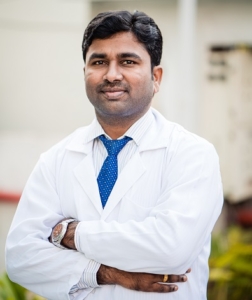Best Doctors for Cancer Treatment in Hyderabad
Cancer
Cancer is a disease in which abnormal cells are formed in any of the body's tissues, and these abnormal cells rapidly multiply in an uncontrollable manner to form a mass or lump known as a tumor, and some of them even spread to other parts of the body. These abnormal body cells do not respond to the normal signals of the body to stop multiplying and die, and they have a tendency to influence blood vessels to supply them with nourishment, hide from the immune system, grow at a much rapid rate when compared to normal cells, and also deprive normal cells of their nutrition. Cancers develop when there is a genetic mutations resulting in the formation of abnormal cells that are not destroyed by the immune system.
208 Doctors for Cancer Treatment found
View Profile
Mythri Hospital
Mehdipatnam
Opp: Pillar No. 81, PVNR Exp Highway
Inner Ring Road, Maruthi Nagar
Mehdipatnam, Hyderabad
Get directions

OP Timings
Mon - Sat | 02:00 pm - 06:00 pm |
CHR Lane
Road Number 1
Gachibowli, Hyderabad
Get directions

OP Timings
Mon - Sat | 09:00 am - 01:00 pm |
Plot No: 8-2-293/82/L/276A
MLA Colony, Road No. 12
Banjara Hills, Hyderabad
Get directions

OP Timings
Fee : 700
CHR Lane
Road Number 1
Gachibowli, Hyderabad
Get directions

OP Timings
Mon - Sat | 02:30 pm - 05:30 pm |
Fee : 800
Plot No: 8-2-293/82/L/276A
MLA Colony, Road No. 12
Banjara Hills, Hyderabad
Get directions

OP Timings
Mon - Sat | 10:00 am - 01:00 pm, 05:30 pm - 06:00 pm |
Fee : 800
Dr. Muddusetty Muralidhar
MBBS, MS, DNB (Surg Onco), MRCS
Fellowship in Surgical Oncology
Surgical Oncologist
View Profile
Plot No 4, Mythrivanam
Satyam Theatre Road, Srinivasa Nagar
Ameerpet, Hyderabad
Get directions

OP Timings
Fee : 850
Plot No. 573/I, 1st Floor
Park View Building, Rd No. 1
Jubliee Hills, Hyderabad
Get directions

OP Timings
Fee : 850
8-2-672/5-6, Virinchi Circle
Road Number 1
Banjara Hills, Hyderabad
Get directions

OP Timings
Fee : 800
Redhills
Beside Niloufer Hospital
Lakdi Ka Pul, Hyderabad
Get directions

OP Timings
Mon - Sat | 09:00 am - 12:00 noon |
CHR Lane
Road Number 1
Gachibowli, Hyderabad
Get directions

OP Timings
Mon - Sat | 08:30 am - 02:30 pm |
Fee : 800
Plot No: 8-2-293/82/L/276A
MLA Colony, Road No. 12
Banjara Hills, Hyderabad
Get directions

OP Timings
Fee : 800
8-2-680/A, Road No12
Sri Ram Nagar Colony
Banjara Hills, Hyderabad
Get directions

OP Timings
Mon,Thu | 12:00 noon - 02:00 pm |
Tue,Fri | 06:00 pm - 07:00 pm |
Wed,Sat | 02:00 pm - 04:00 pm |
Fee : 1000
3-2-848/1, Station Road
Mahalaxmi Nilayam
Kachiguda, Hyderabad
Get directions

OP Timings
Fee : 600
2-6-71, Near Masjid
Bharat Nagar Colony
Uppal, Hyderabad
Get directions

OP Timings
Fee : 500
CHR Lane
Road Number 1
Gachibowli, Hyderabad
Get directions

OP Timings
Mon,Wed,Fri | 10:00 am - 01:00 pm |
8-2-672/5-6, Virinchi Circle
Road Number 1
Banjara Hills, Hyderabad
Get directions

OP Timings
Fee : 500
Plot No 4, Mythrivanam
Satyam Theatre Road, Srinivasa Nagar
Ameerpet, Hyderabad
Get directions

OP Timings
Fee : 850
6-3-903/A and B, Raj Bhavan Rd
Durga Nagar Colony, Beside Maxivision
Somajiguda, Hyderabad
Get directions

OP Timings
Mon - Sat | 01:30 pm - Onwards |
Fee : 1000
Opp: Pillar No. 81, PVNR Exp Highway
Inner Ring Road, Maruthi Nagar
Mehdipatnam, Hyderabad
Get directions

OP Timings
Mon - Sat | 03:00 pm - 05:00 pm |
10-3-761/8, Ahmed Rd
Opp Post Office, SBH Colony
Vijay Nagar Colony, Hyderabad
Get directions

OP Timings
Fee : 500
Redhills
Beside Niloufer Hospital
Lakdi Ka Pul, Hyderabad
Get directions

OP Timings
Mon - Sat | 09:00 am - 02:00 pm |
Arete Hospitals
Gachibowli
Opposite Biodiversity Park
Madhura Nagar Colony
Gachibowli, Hyderabad
Get directions

OP Timings
Mon - Sat | 09:00 am - 05:00 pm |
Fee : 800
Plot No 4, Mythrivanam
Satyam Theatre Road, Srinivasa Nagar
Ameerpet, Hyderabad
Get directions

OP Timings
Fee : 850
Plot No. 573/I, 1st Floor
Park View Building, Rd No. 1
Jubliee Hills, Hyderabad
Get directions

OP Timings
Mon - Sat | 03:00 pm - 06:00 pm |
Fee : 500
16-10-29, Nalgonda X Roads
Near New Market Metro Station
Malakpet, Hyderabad
Get directions

OP Timings
Mon - Sat | 10:00 am - 05:00 pm |
Fee : 600
View Profile
CHR Lane
Road Number 1
Gachibowli, Hyderabad
Get directions

OP Timings
Fee : 800
Plot No: 8-2-293/82/L/276A
MLA Colony, Road No. 12
Banjara Hills, Hyderabad
Get directions
Plot No 4, Mythrivanam
Satyam Theatre Road, Srinivasa Nagar
Ameerpet, Hyderabad
Get directions

OP Timings
Fee : 850
Plot No. 573/I, 1st Floor
Park View Building, Rd No. 1
Jubliee Hills, Hyderabad
Get directions

OP Timings
Fee : 500
1-8-31/1, Minister Road
Krishna Nagar Colony
Begumpet, Hyderabad
Get directions

OP Timings
Mon - Sat | 10:00 am - 05:00 pm |
Fee : 400
View Profile
Special interests :
- HIPEC Surgery
- Laparoscopic and Robotic Cancer Surgery
- Oncoplastic Breast Surgery
Amor Hospital
Kukatpally
6-16/31/5, Y Junction
KKR NKNR Commercial Complex
Kukatpally, Hyderabad
Get directions

OP Timings
Mon - Sat | 10:00 am - 05:00 pm |
Fee : 800
Plot No 4, Mythrivanam
Satyam Theatre Road, Srinivasa Nagar
Ameerpet, Hyderabad
Get directions

OP Timings
Mon - Sat | 04:00 pm - 05:30 pm |
Fee : 850
Plot No. 573/I, 1st Floor
Park View Building, Rd No. 1
Jubliee Hills, Hyderabad
Get directions

OP Timings
Fee : 700
1-8-31/1, Minister Road
Krishna Nagar Colony
Begumpet, Hyderabad
Get directions

OP Timings
Mon - Fri | 10:00 am - 02:30 pm |




















